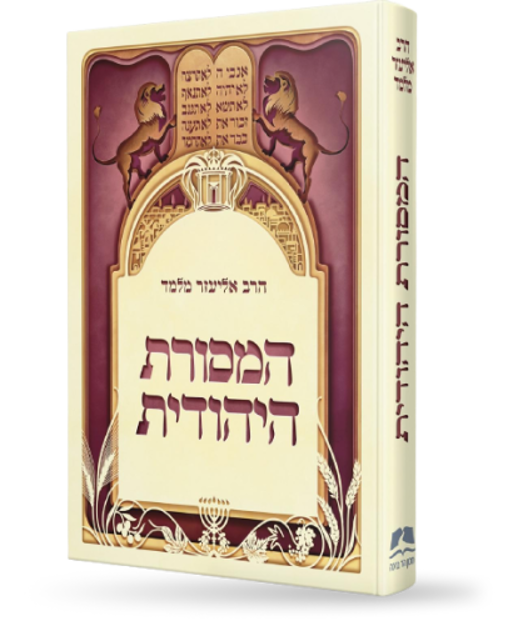The goal of this book is to tell the story of “Jewish Tradition,” a tradition in which halakha (Jewish law) and Jewish history reflect divine ideals and values.
I was inspired to write the book after hearing a talk by Professor Meir Buzaglo. He spoke about the value of the Jewish tradition and how wonderful it would be if it were made available and accessible to all. It struck me that no book to date – in Hebrew – successfully summarizes and presents the faith, values, and laws of Jewish tradition. Later, a number of rabbis involved with conversion, chiefly Rabbi Haim Drukman, asked me to write a book that would clearly explain the fundamentals of Jewish faith and Jewish law.
So I sat down to write, motivated by deep love for my fellow Jews, eager to show them the spiritual treasures found in their own tradition, and full of respect for those interested in converting. While writing, I made every effort to bring the story of Jewish tradition to a broad audience. I am writing both for those who are observant and have a general familiarity with Torah and mitzvot (commandments) but would like to better understand the underlying concepts and principles, and for those who define themselves as secular and who wish to learn what Judaism is.
Despite the need to condense, I have made every effort to be as clear and precise as possible. The book is not meant to persuade you to live a traditional religious life, but rather to present you with an accurate overview of this way of life and the ideas informing it. Hopefully, those wishing to study seriously will find the tradition enjoyable, understandable, and profound. My goal is neither to engage in arguments and polemics with people whose opinions and positions differ from mine, nor to placate them. At the same time, I am not oblivious to the challenges facing us in the areas of ethics, culture, and interfaith relations.
Often, when attempting to explain the Jewish tradition, people emphasize the mitzvot dealing with man’s relationship to God, rounded out with some folklore and customs. But the truth is that the interpersonal mitzvot – those relating to one’s fellow, one’s family, and one’s nation – take priority. Thus, I will not speak primarily of customs, but rather of guiding principles such as charity and justice, kindness and judgment, love and mercy. Therefore, to tell the story accurately, the proper emphasis has been placed on the interpersonal mitzvot.
We begin with the vision of the Jewish nation and the story of its history until the giving of the Torah. This is immediately followed by a description of the important principles of interpersonal mitzvot and the values and laws relating to family life. This completes the first third of the book. The middle third explains the meaning of faith and Torah, and the centrality of the nation, the Land, and the Temple. Following naturally are the practices pertaining to the synagogue, prayers, blessings, kashrut, and the like. The final third of the book deals with Shabbat, holidays, and fast days. They reflect the entire gamut of our values, our interpersonal relationships, and above all our relationship with God. Hence the chapter order itself conveys a worldview and is not random.
The only sources cited in the book are biblical texts. The rest appear in the endnotes. Since I could not include all the details of Jewish law in one book, the sources cited in the back include references to my multi-volume work Peninei Halakha, where readers can broaden their halakhic knowledge.
I shall await the Lord, I shall entreat his favor,
I shall ask Him to grant my tongue eloquence.
In the midst of the congregated nation, I shall sing of His strength;
I shall burst out in joyous melodies for his works.
The thoughts in man’s heart are his to arrange,
but the tongue’s eloquence comes from the Lord.
O Lord, open my lips, so that my mouth may declare Your praise.
(Days of Awe liturgy)
May the words of my mouth and the meditation of my heart find favor before You, Lord, my Rock and Redeemer (daily prayerbook). May it be Your will that my book be accorded a positive and enthusiastic reception by my brothers and sisters. May it provide faith, goodness, and blessing to them and to the entire world.
Eliezer Melamed
Summer 2020
__
From the introduction to the Hebrew vertion of the book "The Jewish Tradition".
The English vertion has not yet been published.
